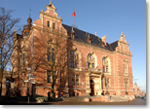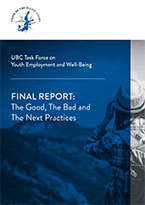Secretariat
Wały Jagiellońskie 1
80-853 Gdańsk Poland
tel. +48 58 301 09 17
tel. +48 58 301 91 23
fax +48 58 301 76 37
 Contact us
Contact us


Statement of the Union of the Baltic Cities by Per Bødker Andersen, President of UBC
at the Conference "Baltic Sea Region - Perspective 2010", Brussels, 23 November 2004
Union of the Baltic Cities (UBC) is a network of over 100 member cities from all 10 Baltic Sea countries, with an overriding goal of contributing to the democratic, economic, social, cultural and environmentally sustainable development of the Baltic Sea Region.
UBC has numerous activities. It coordinates projects and promotes exchange of know-how and experiences between the cities in such areas as: business cooperation, culture, education, environment, health & social affairs, information society, tourism, transport, urban planning, gender equality, involvement of youth.
UBC watch over the interests of its member cities towards the national governments and international bodies such as the European Commission. UBC promotes the Baltic Sea Region issues in Europe and in the World.
How do we see the future of our region? We want to see a dynamic, democratic and stable European Baltic Sea Region in a successful economic, political, social and environmental development process.
The economic, cultural and personal connections across borders and across the Baltic Sea shall flourish supported by a good infrastructure at sea, in ports, on land and by electronic means.
Our region possesses strong resources: natural, human, institutional, cultural and financial capital. It will be able to renew and increase the capital for the interests of present and future generations.
Overall cooperation between the New European Union, Russia and the adjoining areas must develop and barriers impeding it must be diminished.
We want our citizens to live in secure cities with viable local economies, just, peaceful and tolerant communities, and eco-efficiency, united by a clean Baltic Sea.
The highly skilful and active people of the region will make it one of the leading centres of capacity and excellence in the world. As a result, the North of Europe will play an increasingly important role in our continent and globally.
Local government and its activities will be a crucial dimension to achieve this vision. They are developed in an innovative way, including new models of citizen-authority dialogue, public-private partnerships and in cooperation with civil society organisations. Our voice shall be listened at when and where decisions affecting the Baltic Sea Region cities are made.
The cities of the Baltic Sea Region, and their representative, UBC, will actively contribute, enforce and utilise all these capacities for the benefit of the citizens of the member cities and the generations to come.
This year on the 1st of May we have experienced a significant historical moment - the Baltic Sea Region became almost an inland sea of the European Union. This fact will have a strong positive impact on further development of our region.
In the near future we will have free movement of labour, capital and goods across the Baltic Sea. The national legislations in fundamental matters will be based on a common European legal foundation. We will live in a common area based on democracy, freedom and human rights, area with stable economic and political system. Such stability combined with qualified labour force and good educational system will certainly boost the economic development in the whole region. UBC will make every effort to make this development sustainable, taking into account also social and environmental dimension.
Our vision for the Baltic Sea area is that at some point a free-trading zone between the EU and Russia and subsequently a real single market will be created. Before this happens the Russian membership in WTO is necessary. But Russia must first reach the real independence of its executive, legislative and judicial powers and this delays the process towards WTO membership. The future of Russia should be a European future where Russia closely cooperates with its European neighbours. Russia is a Baltic Sea country and should be treated in the same way as other nine Baltic Sea countries. The benefits that Russia obtains from regional cooperation are the same as benefits of other Baltic Sea countries. The regional cooperation should be handled on equal terms between all partners.
Another step should be establishing a Joint Investment Area as proposed by the Council of the Baltic Sea States. Only afterwards we can think about creation of a free trading area or Baltic Sea single market. In this respect we should utilise the experiences of the European Union. In the eighties the national regulations of the member states were replaced by one common European rule. This great idea reduced the complications and costs for business sector operating throughout the European Union. We believe that we can create a Baltic Sea single market between the EU and Russia and we urge the politicians to set up the clear deadlines for implementation of that process. The business community must strongly lobby the politicians to speed up the process.
Some people are afraid that the Baltic Sea Region is not unified, that there is a competition between different geographical centres like Öresund region, Stockholm-Helsinki-St.Petersburg, Berlin, Warsaw etc. We think that such competition is natural, we must accept the competition as the factor which stimulates the growth of the whole region.
The development of the Baltic Sea Region can not be successful if it is steered only by Brussels and national governments. The voice of the cities and regions must be taken into account. At the UBC General Conference in Klaipėda in October 2003, UBC adopted the resolution appealing to the European Commission for regular consultations with local authorities associations, on EC policies which affect local authorities. In January 2004 Commissioner Michel Barnier sent a letter to UBC informing the Commission adopted a communication on "Dialogue with associations of regional and local authorities on the formulation of EU policy". In this communication the EC proposed to give the regional and local representatives an opportunity of expressing their views - via their associations - during annual hearings which will concentrate on the Commission's annual work programme, and the major policy initiatives that have a significant regional and local impact.
UBC and our sister organisation Atlantic Arc Cities made a joint statement on mentioned EC communication. We welcomed an opportunity to meet the Commission on regular basis and at the same time we expressed our opinion that organisations should not only be informed about EU policies but also should be given an opportunity to influence these policies. Our reaction was noted in Brussels. Director General of Regional Policy replied in a letter that annual meetings "will offer the opportunity to the associations to inform the Commission about the expectations of their members concerning the development of EU policies". We must actively use this opportunity to influence the European policies.
Let's take as example the EU transport policy and the EU cross-border cooperation policy.
The Baltic Sea Region for many years has been discriminated in the in the Trans European Network. The situation hopefully changed with the latest EU enlargement. Recently UBC received the European Commission's consultation document on "Motorways of the Seas" concept to be financed through the revised Trans-European Network Transport Guidelines. UBC welcomes the Commission's implementation framework of the "Motorways of the Seas" concept and hopes it will contribute to the improvement of intermodal transportation system in the Baltic Sea Region. UBC Logistics Task Force invited all member cities tomorrow to Brussels to discuss how we can benefit from the EU resources allocated to this new initiative.
Cross-border cooperation can contribute substantially to the cohesion in the Baltic Sea Region. UBC welcomes the objective 3 of the reformed cohesion policy from 2007 - namely the European Territorial Cooperation aimed to strengthen the cross-border and trans-national cooperation. Since several years UBC has been emphasizing that the maritime borders in the Baltic Sea Region should be treated in similar way as the land borders.
The European Commission recently published a proposal for regulation of the European Parliament and of the Council laying down general provisions establishing a European Neighbourhood and Partnership Instrument for the years 2007-2012.
We support the Commission proposal to transform the three strands of Interreg III programme into the two following strands: cross-border cooperation and transnational cooperation to be financed under the objective 3. We also support the shift of the Commission approach as regards funding of cross-border and transnational cooperation - from the "soft" projects concentrating on the exchange of know-how, towards both "soft" and "hard" projects which apart from the exchange of expertise will also produce the concrete investments in missing infrastructure.
The Baltic Sea is the only inland sea within the European Union and thus it requires a special approach. We oppose the limit of 150 km of maritime border to be eligible to obtain funding for cross-border projects within the European Neighbourhood and Partnership Instrument. Our opinion is that in case of the Baltic Sea Region such distance can not be set definitely. We expect from the European Commission a more flexible approach taking into account (1) existing cooperation in various fields between the partners on both sides of maritime border and (2) historical, social, cultural and economical factors which justify cooperation across larger distance than mentioned above.
We can not imagine the situation where regions bordering through the Baltic Sea will be excluded from cross-border cooperation strand within the European Neighbourhood and Partnership Instrument. It would seriously harm the cooperation in the Baltic Sea area and it would undermine our efforts aimed at achieving the balanced development in this unique region once divided in two political systems, now united in the European Union.
Thank You for your attention.




